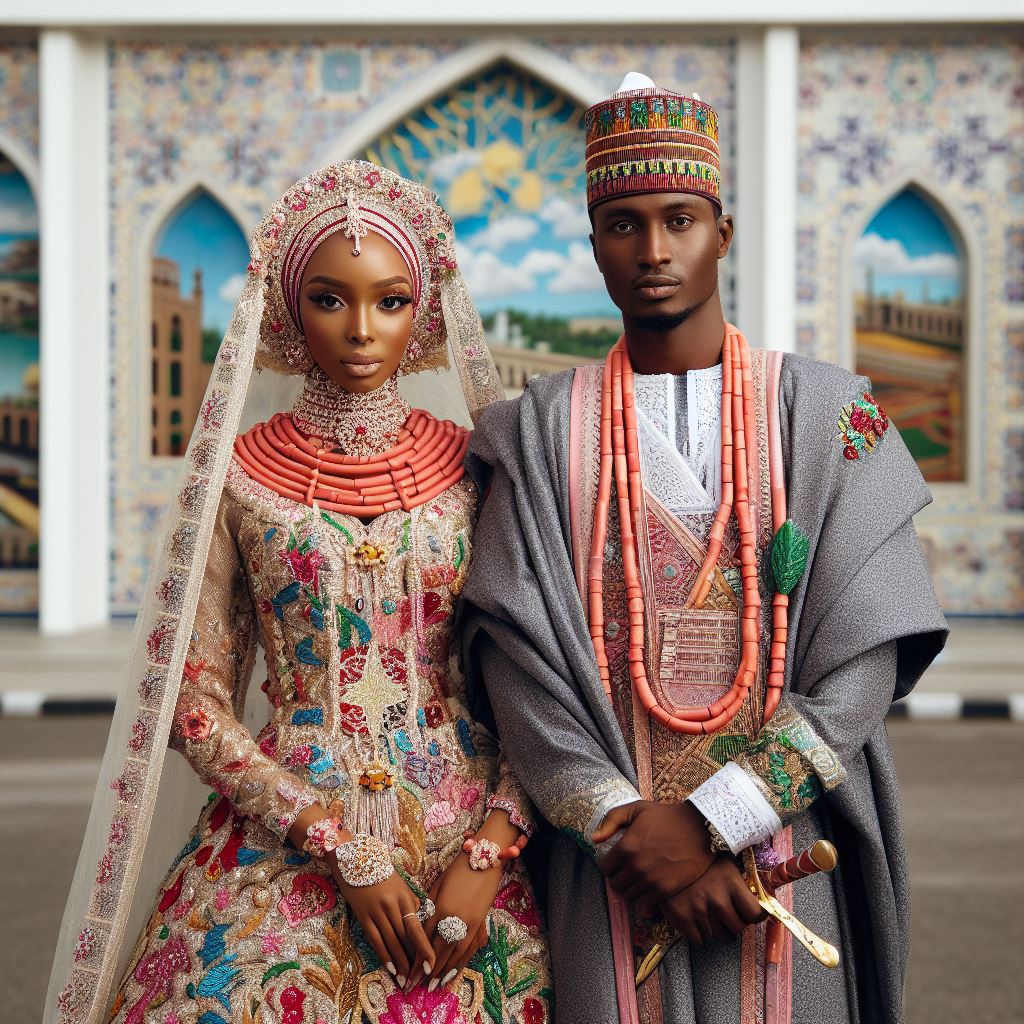Key Differences: Islamic Marriage vs. Marriage by Ordinance
Last Updated on October 18, 2023
Introduction
In Nigeria, there are two main types of marriages: Islamic Marriage and Marriage by Ordinance.
These two forms of marriage have significant differences in terms of their legal frameworks, religious implications, and cultural significance.
Brief Explanation of Islamic Marriage in Nigeria
Islamic Marriage in Nigeria is based on Sharia law, which is derived from the Quran and the teachings of Prophet Muhammad.
It is a religious ceremony that solemnizes the union between a Muslim man and a Muslim woman.
This type of marriage is recognized and accepted by the Muslim community in Nigeria.
Brief Explanation of Marriage by Ordinance in Nigeria
Marriage by Ordinance in Nigeria is a civil marriage that is recognized by the government and legal authorities.
It is performed under the Marriage Act, which outlines the legal requirements and procedures for getting married.
This form of marriage is generally accepted and practiced by individuals of various religious beliefs in Nigeria.
Both Islamic Marriage and Marriage by Ordinance have their own set of rules, regulations, and procedures.
Islamic Marriage involves the consent of the bride and groom, a marriage contract (Nikkah), and the presence of witnesses.
On the other hand, Marriage by Ordinance requires the couple to obtain a marriage license, go through a civil ceremony, and register the marriage with the appropriate authorities.
Basically, Islamic Marriage and Marriage by Ordinance are two distinct forms of marriages in Nigeria.
While Islamic Marriage is rooted in religious and cultural traditions, Marriage by Ordinance follows a legal framework established by the government.
Understanding the differences between these two forms of marriage is essential for individuals planning to get married in Nigeria.
Read: Understanding ‘Marriage by Ordinance’ in Nigeria: A Primer
Islamic Marriage
Definition of Islamic Marriage
Islamic Marriage is not merely a legal contract but a spiritual bond cemented by the mutual love, respect, and commitment between a man and a woman.
It goes beyond societal norms and encompasses the teachings of the Quran and the traditions of Prophet Muhammad.
Process and requirements for an Islamic Marriage
In an Islamic Marriage, both parties willingly enter into a union, recognizing their lifelong responsibilities towards each other and their future family.
It is a partnership based on equality and mutual understanding, where the husband and wife strive to fulfill their roles and obligations.
Consent of both parties
The consent of both parties involved is a fundamental requirement for an Islamic Marriage.
It ensures that the decision to marry is based on free will, without any coercion or compulsion.
Islam emphasizes the importance of choice and urges individuals to marry for love and companionship.
Presence of witnesses
Another essential element of an Islamic Marriage is the presence of witnesses.
Their presence ensures the public recognition and validation of the marriage contract.
By having witnesses, the community acknowledges the union, making it more than a private affair.
Mahr or dowry agreement
In addition to consent and witnesses, the Mahr or dowry agreement is an integral part of Islamic Marriages.
It symbolizes the groom’s commitment and financial responsibility towards the bride.
It can be any valuable asset or monetary gift that the bride receives from the groom, reflecting his willingness to fulfill his duties as a husband.
The Nikah ceremony, officiated by an Islamic authority, solemnizes the marriage contract.
It involves reciting the marriage vows and making the commitment to honor, love, and respect each other.
The ceremony includes prayers, blessings, and supplications for a blessed and harmonious married life.
Rights and obligations of both husband and wife in Islamic Marriage
Islamic law, based on the teachings of the Quran and the Sunnah (the Prophet’s traditions), serves as a guiding framework for Islamic Marriages.
It sets forth the rights and responsibilities of both the husband and wife, aiming to establish a harmonious and balanced relationship.
Role of the Husband
The husband’s role includes providing financial support for the family, ensuring the welfare, and protection of his wife and children.
He is expected to be a caring and responsible partner, treating his wife with kindness, respect, and fairness.
Role of the Wife
On the other hand, the wife’s responsibilities lie in maintaining the household, taking care of the children, and being a supportive and obedient spouse.
Islam emphasizes the importance of mutual consultation and cooperation between husband and wife, as they strive to build a strong and loving family unit.
Generally, Islamic Marriage is a sacred institution that brings two individuals together in a lifelong commitment.
It encompasses not only legal and social aspects but also spiritual and moral dimensions.
The consent, witnesses, Mahr, and Nikah ceremony form essential components of an Islamic Marriage, while Islamic law defines the rights and obligations of both husband and wife, fostering a balanced and loving relationship.
Read: Top Venues for ‘Marriage by Ordinance’ Ceremonies in Nigeria
Marriage by Ordinance
Definition of Marriage by Ordinance
Marriage by Ordinance offers a different perspective on marriage compared to Islamic marriage.
While Islamic marriage is based on religious principles and customs, Marriage by Ordinance is governed by civil law and is secular in nature.
Historical background of Marriage by Ordinance in Nigeria
The historical background of Marriage by Ordinance in Nigeria can be traced back to the colonial era when British law was introduced.
This form of marriage provided a legal structure that was separate from religious practices.
Legal requirements and procedures for Marriage by Ordinance
In order to enter into a valid Marriage by Ordinance, certain legal requirements and procedures must be followed.
Both parties involved must be of legal age, usually 18 years or above.
Consent of both the bride and groom is essential, and the marriage must be registered with the appropriate government authority.
Additionally, the marriage ceremony must be conducted by an authorized marriage officer.
Role of civil law in regulating Marriage by Ordinance
Civil law plays a crucial role in regulating Marriage by Ordinance.
It provides the legal framework for the marriage, ensuring that the rights and obligations of both spouses are protected.
The law sets out the husband’s responsibilities, including financial support for the family and decision-making authority.
The wife, on the other hand, has the right to be treated with dignity and respect and also has specific responsibilities towards the family.
Rights and obligations of both spouses in Marriage by Ordinance
- Husband’s rights and responsibilities: The husband is responsible for the financial support of the family and has decision-making authority.
- Wife’s rights and responsibilities: The wife has the right to be treated with dignity and respect, and she also has certain responsibilities towards the family.
Essentially, Marriage by Ordinance is a form of marriage that is regulated by civil law.
It offers a different perspective on marriage compared to Islamic marriage, which is governed by religious principles.
Understanding the legal requirements, procedures, and rights and obligations associated with Marriage by Ordinance is essential for those considering this type of union in Nigeria.
Read: Advantages and Disadvantages of Marriage by Ordinance in Nigeria

Comparison between Islamic Marriage and Marriage by Ordinance
Purpose and significance of the marriage
- Islamic Marriage: The purpose is to create a sacred bond between a man and a woman. It is considered an important religious duty in Islam.
- Marriage by Ordinance: The purpose is to establish a legal union recognized by the state. It holds legal consequences and provides certain rights and benefits.
Process and requirements for the marriage
- Islamic Marriage: Requires the consent of both parties and their guardian in accordance with Islamic principles. The marriage ceremony is usually conducted by an Imam or a religious authority.
- Marriage by Ordinance: Requires compliance with civil laws and regulations specific to the jurisdiction. Usually involves obtaining a marriage license, fulfilling legal paperwork, and solemnizing the marriage before an authorized person.
Role of religious law and civil law in regulating the marriage
- Islamic Marriage: Religious law, derived from the Quran and Hadith, governs the rights and obligations of the spouses. Civil law may have a limited role in matters such as registration and legal recognition.
- Marriage by Ordinance: Civil law plays a significant role in regulating the marriage and determining the rights and obligations of the spouses. Religious ceremonies may be performed, but the legal aspects are primarily governed by civil laws.
Rights and obligations of both spouses
- Islamic Marriage: Both spouses have equal rights and responsibilities within the framework of Islamic teachings. The husband has the obligation to provide financial support, while the wife has the right to receive it.
- Marriage by Ordinance: Both spouses have equal rights and obligations under the law. Financial responsibilities can be determined by mutual agreement or as stipulated by applicable legal provisions.
Social and cultural aspects connected to the marriage type
- Islamic Marriage: Reflects the cultural and religious practices of the Muslim community. Often includes traditional rituals, customs, and celebrations specific to the culture.
- Marriage by Ordinance: Reflects the diverse social and cultural backgrounds of the individuals involved. It may involve customs and traditions associated with the particular culture or community.
In general, Islamic marriage and marriage by ordinance have differences in their purpose, process, legal regulations, rights, and cultural aspects.
While Islamic marriage emphasizes religious duty and conformity to Islamic teachings, marriage by ordinance focuses on legal recognition and compliance with civil laws.
Both types of marriage hold significance in their respective contexts and play important roles in society.
Read: Marriage by Ordinance vs. Traditional Marriage: What’s Different?
Conclusion
It is evident that Islamic Marriage and Marriage by Ordinance have distinct characteristics and legal implications in Nigeria.
Islamic Marriage is primarily guided by Islamic principles and customs, while Marriage by Ordinance follows the regulations outlined in the Marriage Act of Nigeria.
Understanding the differences between these two types of marriages is crucial in ensuring legal recognition and protection of rights for individuals involved.
Both Islamic Marriage and Marriage by Ordinance hold significant importance in the Nigerian society.
Islamic Marriage is deeply rooted in religious beliefs and traditions, providing a strong foundation for many individuals and families.
On the other hand, Marriage by Ordinance allows for a secular approach, emphasizing legal compliance and formal recognition.
It is essential to foster respect and understanding among individuals with different marital customs and beliefs.
Recognizing the importance of both Islamic Marriage and Marriage by Ordinance can contribute to a more inclusive society that respects diverse traditions and legal frameworks.
By promoting dialogue and education, we can bridge the gaps between these different types of marriages and foster a sense of unity and mutual respect.
In a nutshell, Nigerian society can benefit from recognizing and appreciating the diversity of marital customs and beliefs, creating an environment that values and protects the rights of all individuals, regardless of their chosen marriage type.


